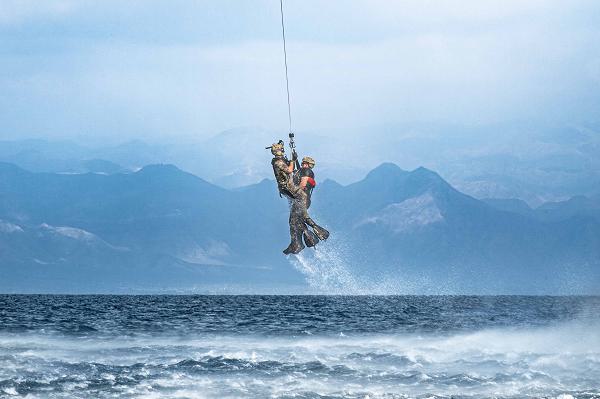
Camp Lemonnier, Djibouti. (December 28, 2024): Due to increasing attacks by Houthi rebels on shipping in the Red Sea, the Djiboutian Coast Guard has intensified training for at-sea rescues. In this photo by Staff Sergeant Jana Somero, a U.S. Airman recovers personnel from the water by helicopter during operation Bull Shark, a biannual joint training event involving the U.S., Djiboutian, Spanish and French navies. The exercise simulated multiple personnel recoveries at-sea that challenged the ability of participating nations to coordinate land, sea, and air components in an emergency.
To prepare for Bull Shark, the U.S. Navy’s Maritime Expeditionary Security Squadron conducted weapons familiarization training for Djiboutian Coast Guardsmen in March. American Sailors also trained with the Djiboutian Navy and Coast Guard for three months on maritime navigation, boat operations, boarding, search and seizure, and rescue operations.
The event kicked off with U.S. Air Force pararescue personnel from the 82nd Expeditionary Rescue Squadron executing a water extraction while coordinating with the Djiboutian Navy and the Spanish Navy frigate Santa María. Participants also conducted simulated land rescues involving a mock downed aircraft on a beach. The teams had to locate and rescue a casualty while providing emergency medical care under hostile conditions.
Operation Bull Shark is just one of many efforts by lawful nations to respond to Houthi terrorist attacks on commercial shipping in the Horn-of-Africa. The Port of Djibouti is separated from Yemen by the narrow Strait of Bab el-Mandeb, one of the world’s busiest shipping lanes. The Djibouti Coast Guard routinely encounters criminal groups seeking to ship drugs among the nearly 2,000 cargo vessels that enter the Port annually.
Exercises like these ensure the free navigation of international waters for all countries.


